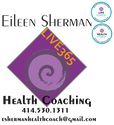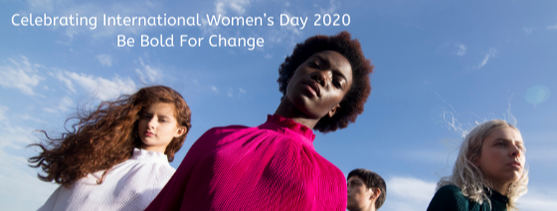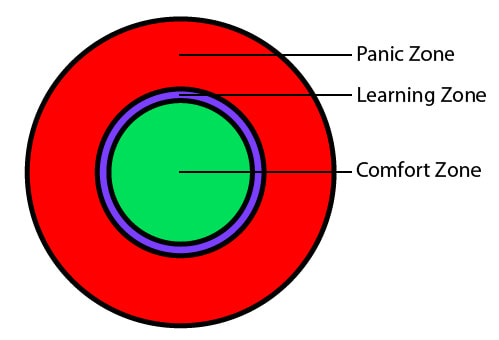|
By Eileen Sherman PhD, MBA, BS, RN I have come to learn that even the most difficult change leads to positive outcomes. Being a junkie for change, I’m ecstatic that the theme for International Women's Day 2020 is "Be Bold For Change". With that theme in mind, I can't help but think back to a concept I've used in the past with different audiences of professionals and students: The 3 Zones Everyone Should Know About by Seth Sandler The Comfort Zone According to Seth Sandler, "The comfort zone is where many of us operate. It’s the location of the skills and abilities we’ve acquired. While the comfort zone is by definition the most ‘comfortable’, we can’t make progress or build skills, or change in the comfort zone since it consists of the abilities we can already do easily." As you can tell, many people love to stay in our comfort zone. The Panic Zone The panic zone lies outside of our skills and abilities, and therefore outside of our level of comfort. Operating in this zone can cause stress and anxiety because the task(s) at hand may be difficult, unknown or even dangerous. Seth says, " The overall feeling of the panic zone is that we are uncomfortable and possibly discouraged. Like the comfort zone, we can’t make progress in the panic zone. We become fearful in this zone." The Learning Zone The learning zone lies in the space between comfort and panic, in which we are stretching our abilities and taking on new experiences without putting ourselves in a position of overreaching, avoiding panic. According to Seth, " One can only make progress by choosing activities in the learning zone. The skills and abilities that are just out of reach are in the learning zone; they’re neither so far away that we panic nor close enough where they’re too easy." So what does this visual have to do with being bold for change? Well, I can tell you from my own personal and professional stories that no change for me takes place when I am squarely in my comfort zone, where I am confident in my abilities. Staying in this comfort zone doesn’t happen all too often. Frankly, I can’t even recall a time I hung out in this zone for an extended period of time. Being bold for change requires us to stretch our abilities and strategically move out of our comfort zone and into the learning zone. Extending Our Learning Zones You’ll notice in the visual how small the learning zone is. Straddling the learning and panic zones can be a delicate balancing act. A few years ago, I became The Dean of the School of Business at Alverno College, an all women school (with men in the graduate programs). I taught the capstone course in an MBA program a few years back: Creating Agility in Dynamic Environments: a course focusing on change management, leadership and teamwork in response to changing environments and markets. Incorporating my passion for community engagement and stressing its importance for future business leaders, I readily accepted a challenging project from a corporate foundation. Our capstone students were to practice as consultants for the foundation in a community of great need. The project, part of a larger grant that the foundation had been working on for impoverished community neighborhoods, was to identify a vacant lot of land and establish a grocery store. We were tasked with determining how to bring healthier food sources into an impoverished neighborhood on the city’s north side. This neighborhood had high crime and unemployment rates, and it was considered a USDA Food Desert (without a grocery store within a 5 mile radius). We not only needed to establish healthier food sources, but the sources had to be easily accessible and affordable. The class learned that the foundation's agenda didn't necessarily match the neighborhood's agenda at the start. As a group comprised mostly caucasian students in a neighborhood that was mostly African American, we were strangers to this neighborhood. We didn’t know anything about the issues in this community per se, and the residents didn’t really trust us at first. As you can imagine, the students, as well as myself, had to be bold for change despite being in our panic zones. We were a bit uncomfortable with our surroundings, and we had to approach this project with humility. We began to ease into our learning zones, stepping back and listening to what the community history and residents were telling us. Then we started building important relationships with the neighborhood, reflecting on our own biases and stereotypes of poverty. We were all afraid of failing the foundation, this community and ourselves. I'm happy to say that after three semesters and three cohorts of students, the project was still ongoing. We had a seat at the neighborhood association’s table as a major stakeholder. We had continued to edge this community forward, building trust and lifelong relationships along the way. We were even assisting the neighborhood association to become a 501(c)3 non-profit and developing a resident-owned food co-op that would provide access to healthy affordable locally grown choices. In addition, we continued to work with the foundation to develop a 5-course certificate program for neighborhood residents, often women, who had expressed interest in continuing their education in business. This would empower them to become the future voices and leaders of their own communities. These women were stretching their own learning zones, taking on their own challenges in spite of the socio-economic situations they were in. And they were already leaders by leaving their comfort zones. I am forever proud of all of these students, and the work we had accomplished. It was a bold move, and it was clearly building a case for change. My Own Life Zones So what was my personal journey throughout these life zones? I never planned to be the Dean of a Business School, but rather a Cardiologist, starting off as a critical care nurse, hoping to go to Medical School. Alas, it wasn’t in the cards. Instead I decided to go the administrative route, attending Grad School at Boston University, getting my MBA and becoming the COO of a major hospital system in Massachusetts. I continued to push beyond my comfort zone every chance I could. I moved from Boston to Wisconsin, got my PhD from Marquette and had the good fortune of being a faculty member at several great Universities before leaving academia and opening my own coaching practice. My life hasn't always been a smooth ride in the comfort and learning zones. Thirteen (13) years ago, I had to bury my second husband and best friend. He died too soon at the age of 59 from stage 4 esophageal cancer. If there was ever a time that I felt most yanked out of my comfort zone, straight through my learning zone, and into my panic zone, that was it. Hearing the words from the doctor that he only had 8 months to live was the worst thing I could've ever imagined. Though my husband, a cancer specialist, proved his own diagnosis wrong by having the strength to live on 5 1/2 years more than projected, it was still too soon. I was never in my comfort zone during those 5 1/2 years, always teetering in my learning zone, gaining more knowledge of this hideous disease and trying very hard to stay out of my panic zone. I was pretending to be the rock everyone was expecting me to be. It has taken me almost 13 years since 2007 to migrate fully back into my comfort zone. Life had changed for me, and if there was ever a time to be bold for change, this was it. My identity was in question. What was I supposed to do? How would I continue to be a role model for my kids? How could I continue to push out of my comfort zone and continue learning, stretching, changing, and wanting that? Since that time, I have owned and operated and sold 3 small businesses based on my passions. I've watched my kids grow up, graduate, get deployed to Iraq and Afghanistan, get married and have children of their own. I’ve continued to learn through several certifications in continuing education and coaching, and have had the good fortune to work and travel. I took a break from academia and retrained as a professional chef. I’ve sold a couple of properties, have had several broken bones from riding and jumping horses, and even ventured back into my comfort zone a few times a week riding my current horse Zeus. I now have a great “significant other” in my life, we have a beautiful home with our beloved pups, Diesel, Daphne, and Trixie. We are surrounded by great people: people who encourage, challenge, push, and sometimes even pull us into and out of our different life zones. So get involved, be bold, come out of your comfort zone. Push well into your learning zone, take a risk, develop a cause, support a cause, whether at an individual level, team and work group level, or community level. Seek Support from a Certified Life Coach Need a little support? Contact me to schedule a free initial consultation or view my other services: divorce coaching, grief coaching, cleanse and diet reset and the 90-day transformation. Receive a customized plan that will boost your well-being and have you feeling balanced in all aspects of your life. Never stop being bold for change and exercising your voice when you feel strong, while practicing humility. I’m thankful to the many who have allowed me to migrate into and out of my three zones.
0 Comments
Leave a Reply. |
Categories |



 RSS Feed
RSS Feed